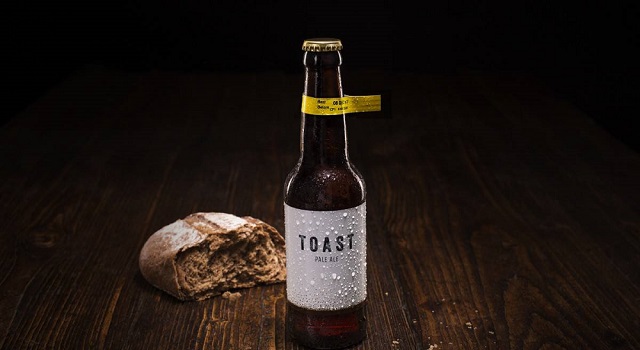
Driffield, United Kingdom | AFP | At a brewery nestled in rolling farmland in northern England, the process of making beer begins with dropping dozens of unwanted loaf ends, thrown away by a sandwich factory, into a large stainless steel tank.
Add water, hops and yeast, and out comes the unmistakable golden beverage popular the world over.
“We’re essentially substituting part of the malt for bread,” says Alex Balchin, head of the Wold Top Brewery, near Driffield in Yorkshire, of the brew which has no discernible bread-like taste.
The brewery uses some of the tonnes of discarded uneaten bread in Britain to produce beer in support of an initiative fighting food waste — and the idea is being exported around the world.
Behind the concept of is Tristram Stuart, who set up Feedback, an anti-food waste organisation.
He began producing the beverage last year, drawing inspiration from a small Belgian microbrewery — Brussels Beer Project — that started making a beer from leftover bread, called “Babylone”, in 2015.
“They explained to me that the ancient Babylonians actually invented beer to preserve bread and other grains that otherwise would be wasted,” says 40-year-old Stuart.
“That was the original purpose of the drink.”
– ‘Bloomin’ lovely’ –
Stuart’s research has found that “industrial quantities” of bread are being wasted globally, more than food aid charities can utilise, while the global craft beer brewing movement has continued to flourish.
“I wanted to set up a company that matches up local sources of wasted bread, local brewers, local non-profits, and build Toast Ale into a global company that turns bread that is perfectly good into beer that is even better,” Stuart says.
The profits, after partner brewers have claimed their production expenses, are donated to Feedback, while any grains left after brewing are recycled to feed livestock.
His first Toast Ale was produced on the TV show of British celebrity chef Jamie Oliver, who declared it “bloomin’ lovely”.
Now the Toast Ale concept comes in lager or pale ale varieties, while some partner breweries have come up with their own versions too, such as the Bread Pudding created by the Bristol-based Wiper and True.
At Wold Top, the brewers started out with traditional loaves, using white and brown sliced bread, Balchin says.
“Now we are experimenting with other things as well, finger rolls, some buns and various sorts of things,” he adds.
“We’ve tried all sort of breads and they all seem to work so far.”
In Britain, 9.8 tonnes of bread have already been used to produce more than 300,000 beers, sold for between 2.5 and three pounds each (between 2.8 and 3.4 euros, $1.3 – $4.0), a similar price to other craft beers.
It is a small step for the environment, but there is a lot left to do.
Some 44 percent of the bread produced in Britain ends up in the rubbish, nearly 900,000 tonnes annually, making it the most wasted food item.
“It is deeply depressing if you look at what is going on globally,” says Stuart.
“But the solution of this problem turns (out) to be delicious.”
– The paradox –
His business has grown fast, with Toast Ale currently being brewed in New York, Rio de Janeiro and Cape Town.
His recipe for turning bread into beer has also been posted on the internet so anyone can learn how to brew it and make their own contribution to reducing food waste.
“That’s now been downloaded 16,000 times, it really is being used by a lot of people,” Stuart enthuses.
He now wants to develop a licence for any brewer in the world to commercially produce the ale, in association with local unsold bread suppliers.
But, with the ultimate goal of Feedback to reduce the massive production of bread, Stuart faces a paradox in his venture.
“We hope to end our business,” he says.
“The day the bread is no longer thrown in the trash, Toast Ale will have no more reason to be.”
 The Independent Uganda: You get the Truth we Pay the Price
The Independent Uganda: You get the Truth we Pay the Price


